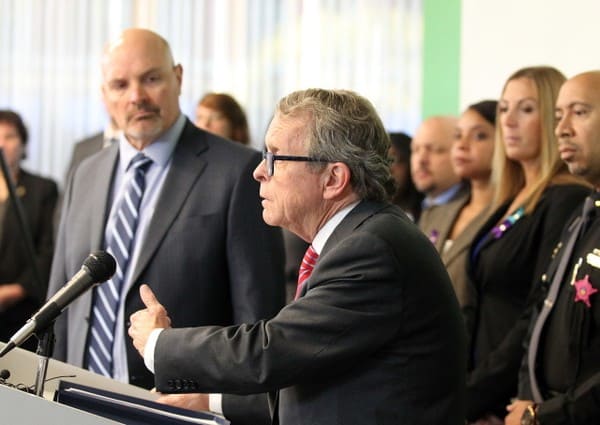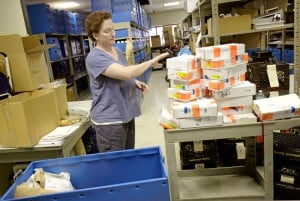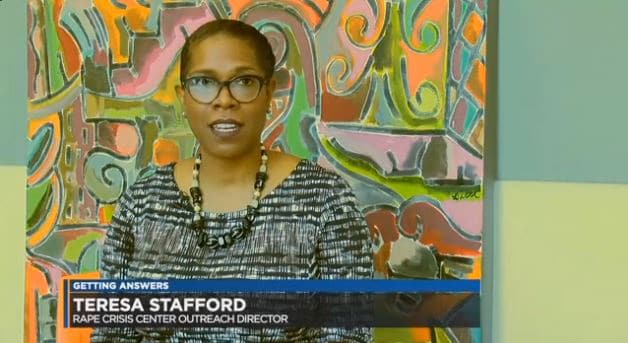President & CEO Sondra Miller joins WKYC’s We The People to speak about untested rape kits in Cuyahoga County and the upcoming film I Am Evidence.
“JEFFERSON — ‘It happens here, and it happens in plain sight,’ Teresa Stafford, senior director of victim services and outreach at Cleveland Rape Crisis Center, said Thursday during the ‘Human Trafficking: Under the Radar in Our Community‘ training at Jefferson Area High School.
“The seminar for counselors, social workers, law enforcement personnel and medical professionals focused on awareness and recognizing the risk factors for, and signs of, human trafficking in northeast Ohio.
“Stafford was one of three presenters for the event, which was a collaboration between Homesafe, Cleveland Rape Crisis Center and the Harriet Tubman Movement. Also presenting were Laura Bartchak, director of the Harriet Tubman Movement, and Keyna Smith, Project STAR (Sex Trafficking Advocacy and Recovery) coordinator for CRCC.
“’Survivors of trafficking didn’t choose this lifestyle, and oftentimes, life before being trafficked was (difficult), and they deserve the support of the community and the systems,’ Stafford said. ‘Having awareness programs like this is a great first step.’
“The most powerful words you can say to a survivor are ‘I believe you,’” Stafford said.”
Continue Reading: Human Trafficking is an Often-Invisible Community Problem
“CLEVELAND, Ohio – In 2002, Cleveland officials announced a plan to turn around the police department’s troubled sex crimes unit.
“The promises came weeks after The Plain Dealer reported on an internal investigation that showed years of mounting problems in the unit: uninvestigated cases, staggering workloads and supervisory lapses.
“Department and city leaders pledged to staff the unit with more detectives, to provide them with needed training and to increase supervision over investigations.
“It was one of many times in the three decades since the unit was created that such promises were made.
“Yet problems, some of the very same ones, persist.”
“‘In Cleveland, we’ve made attempts at cultural change, but the resources needed to make the fundamental change have not yet been committed,’ Sondra Miller said.”
Continue Reading: Cleveland Sex Crimes Unit Faces Scrutiny as Questions about Priorities and Staffing Resurface
“CLEVELAND – News 5 first broke the story over six years ago – learning nearly 14,000 rape kits had been sitting on shelves untested, some dating back to the 1970’s.
“Just last week, the Ohio Attorney General announced the backlog of rape kits had been cleared. News 5 has since learned that’s not entirely true – the Cleveland Police Department, until recently, was still holding on to some untested kits.
“Starting in 2011, AG Mike Dewine asked police departments statewide to send the untested evidence to a crime lab. In 2014, a state law passed requiring all law enforcement to submit rape kits within 30 days.”
“‘Survivors submitted the evidence to be tested, and we believe that it should be,’ said Rape Crisis Center chief external affairs officer Sarah Trimble.”
Continue Reading: Ohio Law Requires Officers to Submit Rape Kits Within 30 Days, but No Consequences If They Don’t

“The testing of nearly 14,000 formerly shelved Ohio rape kits is complete.
“The unprecedented undertaking already has changed the culture and will have a lasting impact on how police understand and investigate rape, Attorney General Mike DeWine said.
“In 2011, when DeWine first asked departments to start sending untested kits, which dated back decades, it was hotly debated whether the effort to test them was worth it.
“Nearly 300 law enforcement agencies eventually sent a total of 13,931 kits. The results, DeWine said, have shut down any argument as to the value of the undertaking:
“There are many lessons to be learned from this work. Among those lessons, we know that it is never too late to tell a survivor that we believe them and that they did not deserve what happened to them.” – Sondra Miller, President & CEO, Cleveland Rape Crisis Center
Continue Reading: Completed Testing of 13,931 Rape Kits Signals Progress, Unfinished Business and Investigations Remain

“CLEVELAND, Ohio – Cleveland police failed over three years to send hundreds of rape kits collected from sexual assault victims to a lab for testing, in violation of state law.
“An Ohio law that took effect in 2015 requires rape kits to be sent to a lab within 30 days.
“The department discovered in 2017 that a detective responsible for transporting the evidence to the county-run crime lab had not been submitting all of the kits in a timely manner, creating what the department referred to in emails as a ‘backlog.’
“Cleveland Rape Crisis Center President & CEO Sondra Miller said she’s ‘disheartened’ that the department didn’t follow established protocols to send every sexual assault evidence kit to a crime lab for testing.
“‘Behind each and every kit there is a human being who was harmed in an immeasurable way,’ she said. ‘People deserve better.'”
Continue Reading: Cleveland Police Failed to Send Hundreds of Recent Rape Kits for Testing, in Violation of State Law

“CLEVELAND, OH (WOIO) – Ohio ranks fourth in the nation for human trafficking.
“In a recent report from the Ohio Human Trafficking Task Force, more than 300 people in the state were victims of sex trafficking, about 25 were trafficked for hard labor, and another eight were trafficked for both purposes.
“‘On the service, it sounds bad, but the reality is, we know that human trafficking is taking place in every community in our country,’ said Teresa Stafford, Senior Director of Victims Services and Outreach at the Cleveland Rape Crisis Center. ‘Being ranked so high means Ohio is identifying survivors of trafficking.'”
Watch the video and continue reading: Ohio Ranks Fourth in the Country for Human Trafficking Cases

“COLUMBUS, Ohio — Advocates for women say the wave of high profile sexual abuse allegations is helping survivors in Ohio find their voices. But who can they trust?
“In a survey of Cuyahoga County residents, most respondents said if they needed assistance after a sexual assault, they would turn to a doctor, nurse, teacher or caseworker. Sondra Miller, president and CEO of the Cleveland Rape Crisis Center, said the findings underscore how important it is for people in those roles to know how to respond to a survivor immediately following such a disclosure.
“‘What can I do to let these individuals know I’m a safe person to talk about this?’ Miller said. ‘How can I be trained and how can I have the skills to respond compassionately, and in a way that helps survivors overcome trauma, as opposed to re-traumatizing them?'”
Continue reading: Sexual Assault: Where Do Ohio Survivors Turn for Help?